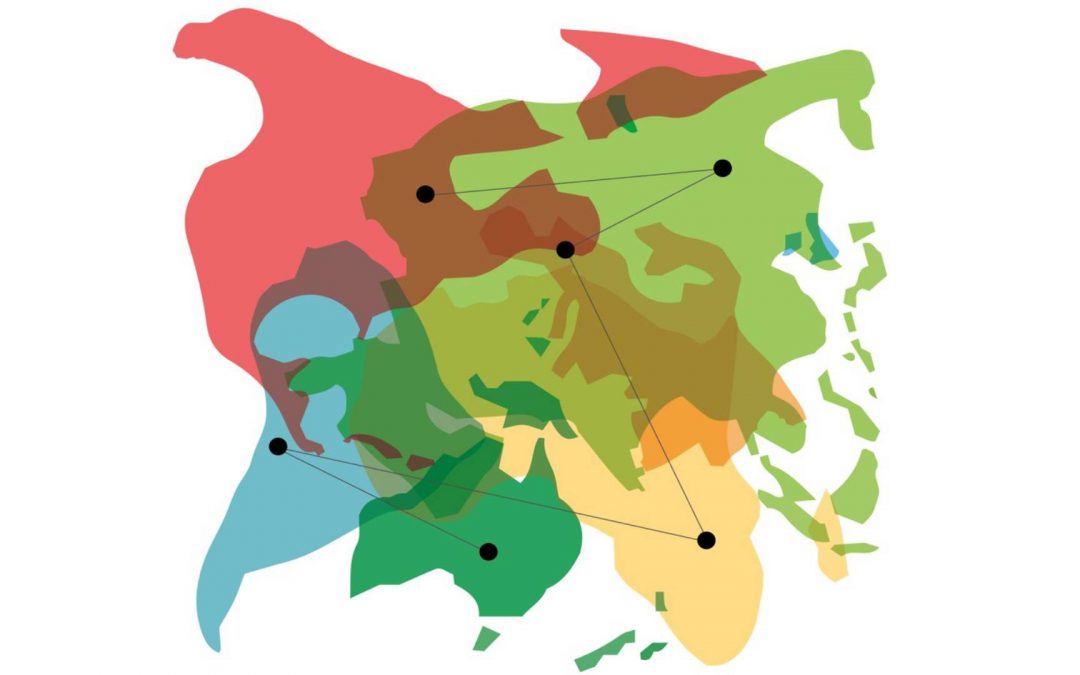GRIP publishes the new winners of the 2023 call for proposals

© Reserved rights
GRIP publishes the new winners of the 2023 call for proposals
Academic publication practices and evaluation standards: asymmetries in the circulation of knowledge linked to Open Access and APCs in non-hegemonic countries
This research project is the second stage of the international survey of “Open science, access and circulation of knowledge in Latin America and Africa” developed during 2023 and aimed to researchers in Brasil, Mexico, Argentina, South Africa and Sénégal. The survey and the comparative studies in progress analyse the APC model of open access and its consequences for non-hegemonic countries. Based on the survey results, this second stage of the project will conduct qualitative complementary studies with interviews to researchers and journal editors. It will analyse the perceptions and the value awarded to “mainstream” journals by researchers in the countries involved, the weight of the predatory journalsg, and the alternative publishing circuits in both continents. It will focus on research assessment policies in order to build recommendations to foster non-commercial open communication.
Project leaders: Fernanda Beigel et Rigas Arvanitis
Partner institutions: CEPED et CONICET
Amount allocated: 15 000 eur
Societal International symposium: Engagement of Organizations and Sustainability in Africa: Catalysts for Resilience in Multiple Crises?
The social demand for considering the social, environmental, and economic impacts of organizations’ activities internationally is growing and is no longer limited to northern countries. The organization of an international symposium on the societal engagement of organizations and on sustainability in Africa aims to highlight and compare the different models of societal engagement in Africa and to analyze in a comparative perspective the contribution of these models for the challenges of the multiple crises facing the continent. This will stimulate reflection on how issues of responsibility and sustainability are considered in global exchanges, in the mobility of actors and the dissemination of standards, while taking into account specific African realities. This articulation contributes to a more complete understanding of these issues in an increasingly interconnected world where the norms of societal engagement of organizations circulate rapidly from one country to another.
Project leader: Amel Ben Rouhma
Partner institutions: LADYSS, CESSMA, CEDAG et CEPED
Amount allocated: 6 500 eur
The future of hospitals – scenarios from the global South
How do we approach the hospital of the future from the South and from a social science and humanities perspective that centres the human being, humanity and human dignity? Do societies and human beings need to build more hospitals? With whose labour, whose money, for whose benefits? And for what purposes? To isolate and treat respiratory syndromes? To monitor and contain (re)emerging viruses? To look after victims of earthquakes or terrorist attacks – while hospitals have become common bombing targets ? Or to deal with the massive toll of chronic diseases and cancers linked to demographic change (aging), toxic expositions and eating habits? The impression that medical or public health priorities dictate the scenarios can be misleading: geopolitics and global capitalism shape them in many other ways. We then want to ask: Is it possible to challenge and rethink the scenarii proposed by global capitalism?
This project wishes to foster an epistemic discussion and propose methodological experimentations to the study of the future of hospitals or the hospital of the future, from the South, most particularly from South Africa, the African continent and Brazil. At the core of our work and reflexion is the willingness to engage in a long-term collaborative relationship that can reflect deeply on the ethics and politics of North-South scientific partnerships (Gebremariam et al. 2023).
Project leaders: Fanny Chabrol et Divine Fuh
Partner institutions: CEPED et HUMA
Allocated amount: 15 000 eur
Sociotechnical transformations, environmental degradation and growing asymmetries: Latin America in the ecological transition
The project investigates how – in Latin America – institutions position themselves in relation to the ecological issue through innovation, and the reactions of social movements to these official policies. While new technologies are facilitating the transformations required for the ecological transition, a logic of unchanged continuous growth is leading to the reproduction of the exploitation of unsustainable resources. The functioning of institutions is essential, because technological transformations interact with political decisions. However, many Latin American countries have limited capacity in science, technology and innovation, and their policies oscillate between sustainable environmental & energy policies and the pursuit of extractivist activities. Against this backdrop, social movements are springing up to refuse to sacrifice the environment to exclusive economic development, sometimes succeeding in influencing the adoption of socio-environmental public policies by some governments.
Project leaders: Jean-Baptiste Meyer et Alexis Mercado
Partner institutions: CEPED et Universités de Venezuela, Honduras, Brasil, Argentina, Colombia
Allocated amount: 15 000 eur
Reshaping Business in an Uncertain World 2
The ‘Reshaping Business in an Uncertain World 2’ project aims to analyse reorganisations in business networks and adaptations in economic activities in a global context of uncertainty and crisis. This research contributes to discussions on the future of the socio-economic sphere, territorial restructuring and changes in legal frameworks, and is in line with the questions explored by GRIP’s ‘Circulations’ axis. It is structured on four interdisciplinary research axes (law, economics, geography, management) and is based on three UPCité laboratories as well as a network of 9 foreign universities.
The Rebus 2 project is designed to deepen the research already underway by conducting two additional field studies, in Indonesia and France. The aim is also to ensure the restitution and publication of the work carried out by the participating teams, to support the ongoing research of six doctoral students and to finalise the preparation of an ANR project.
Project leaders: Gautier Bourdeaux et Pepita Ould-Ahmed
Partner institutions: CEDAG, CESSMA et LADYSS (UPCité) ainsi que 9 universités étrangères en Allemagne, Bulgarie, Grèce, Inde, Indonésie, Malaisie, Maroc, Tunisie.
Allocated amount: 15 000 eur
Financialisation by the margins and from below
The project is based on the consolidation of an interdisciplinary and international network of researchers engaged in multi-scalar socio-economic and ethnographic analyses of financialisation. By comparing long-term data (already collected) from multiple fields, our aim is to build a common analytical framework to account for the diversity of forms and degrees of financialisation. By drawing on tools from political and institutional economics, economic anthropology and certain feminist theories, combining a material and intimate approach to finance, and making the most of conceptual tools developed by our colleagues in the South, our project aims to take a fresh look at the diversity and complexity of financialisation and its consequences in terms of inequality. The aim of this framework is to trace the financial chains from working-class backgrounds to financial centres in order to gain a better understanding of the processes of financial accumulation, their diversity and their consequences in terms of the growth and renewal of multiple inequalities. To carry out this research, we will be organising monthly seminars, a workshop and an international colloquium.
Project leaders: Isabelle Guerin et Timothée Narring
Partner institutions: CESSMA et Maroc, Inde et Brésil
Allocated amount: 15 000 eur (research project) and 5000 eur (international symposium)
When circulation cease: Uncovering the complexities of global pharmaceutical systems through pharmacists nexus p erspective
The aim of this qualitative project is to connect the global challenges with individuals , by uncovering the real world challenges of those striving to deliver a health system in the absence of reliably circulating pharmaceutical system s. The project propose to create a podcast series that interviews the individuals who operat e at the nexus between the se inter dependent health and pharmaceutical systems : pharmacists Each pharmacist will explore a specific case in which a critical medical product ceased to circulate . They will offer their understanding of the ‘globalised’ issues that created the problem, and describe the impact that this had on their personal practice. The investigators will analyse each interview to identify and articulate the practical and ethical challenges that arise when medical products fail to circulate and offer insights into how these connect to the broader sociopolitical and Global Health context in which they occur.
Project leaders: Kate Enright et Ariadna Nebot Giralt
Partner institutions: CEPED et Humanitarian Health Ethics research group (Canada)
Allocated amount: 9800 eur
Religious dynamics in Africa - DYNRELAF
This project, led by Roman Loimeier and Marc-Antoine Pérouse de Montclos, a German anthropologist from the University of Göttingen and a French political scientist from the IRD (Institut de recherche pour le développement) at Ceped, combines quantitative and qualitative analyses to study the circulation of religious models in Africa. From a comparative perspective, the aim is not just to look at Christians or Muslims, but also at hybrid communities of belief that are difficult to define in terms of the dominant narratives on denominational affiliations on a global scale. The research will be based on a wide variety of case studies, in French-speaking, English-speaking, Portuguese-speaking, Arabic-speaking and multilingual countries: Niger, Benin, Togo, Mali, Madagascar, South Africa, Mozambique, Tanzania, South Sudan, Ethiopia, Egypt, Morocco, Congo and DRC.
Project leaders: Roman Loimeier et Marc-Antoine Pérouse de Montclos
Partner institutions: CEPED et Université de Göttingen, Allemagne
Amount allocated: 15 000 eur
DIGITALECO
The advancement of digitalization processes facilitates the diversification of modes of institutionalization of capital-labor relations, favoring labor relations diverging from wage labor. Literature shows that both in the North and the South the “technification” of different forms of capitalism, far from a simple equivalent of the replacement of human labor or a technical answer to varied asymmetries, becomes a means that transforms wage relations into essential production links. Beyond the elements of institutional language promoting the digital economy (DE) as the unavoidable new global transformation, the diversification of capital-labor relations leads to novel social insecurities for workers. Attending the need to advance with an intersectional perspective on the matter and based on a mixed empirical strategy, the DIGITALECO project offers a comparative perspective between Argentina and France in order to characterize the recent evolution of local labor markets and their segmentation for workers in the DE. Finally, the project evaluates the scope of public policies implemented to facilitate access to goods, services, and knowledge necessary for professional integration linked to digital technologies, in both countries.
Project leaders: Thibaud Deguilhem et Romina Cutuli
Partner institutions: LADYSS et Universidad Nacional Mar del Plata, Argentina
Allocated amount: 13 500 eur
National constructions and anthropology from cuba and haiti
This project compares the impact of knowledge and its circulation – particularly anthropology – on national construction in Cuba and Haiti. It brings together researchers from France (URMIS -Université Paris Cité, IRD, CNRS, Université Côte d’Azur), Cuba (ICIC, ICAN) and Haiti (LADIREP, UEH).
It focuses in particular on the years 1940-1970, a crucial period marked by a redefinition of identities and otherness, in a global context characterized by the Cold War and decolonization. Haiti and Cuba played a singular and little-known role in the emergence of Caribbean, Pan-American and international scientific, political, literary and artistic networks.
In both contexts, the aim is to link epistemological reflection to a questioning of the hierarchical processes involved in research and teaching. In particular, we will examine two “unthought” aspects of Cuban and Haitian anthropologies: the question of migration (internal and external), which blurs the political and symbolic boundaries of the nation, and the dynamics of racialization and discrimination (based on phenotype, gender or socio-economic background), which reactivate the fabrication of “endogenous otherness”. By providing information on national histories inscribed in a Caribbean, Mesoamerican and transatlantic framework, this project aims to add new chapters to a global epistemological reflection on the discipline.
Project leaders: Kali Argyriadis et Maud Laëthier
Partner institutions: URMIS, Haiti et Cuba
Allocated amount: 15 000 eur
The effects of Chinese participation in international technical standardisation: consolidating or weakening the consensus?
The research project concerns China’s action in the area of international technical standardization. International technical standardization guarantees the interoperability of industrial goods and services, thus promoting the integration of globalized production chains. China’s participation in multilateral technical standardization forums has grown exponentially since 2008. Its approach however differs from the historical actors of technical standardization coming from the United States, Europe, Japan and South Korea. While these countries have sent private experts to the International Organization for Standardization (ISO), the International Electrotechnical Commission (IEC) and the International Telecommunication Union (ITU), China sends cadres who represent state policy as well as industry interest. My project focuses on the modes of negotiation that the interaction of these different cultures allow.
Project leaders: Juliette Genevaz et Sarah Eaton
Partner institutions: IFRAE et INALCO et Humboldt – Berlin (Allemagne)
Allocated amount: 10 000 eur
ReconfigUrb: Coalescing New Transnational Urban Spatialities Through Reconfigured Electronics and Cars
Our preliminary explorations of second hand car and refurbished electronics across various ‘off the map’ sites in India and Dubai open new conceptual and empirical grounds on thinking about the ‘globalisation from below’1 that rightly emphasises transnational mostly
small traders, and nuanced explorations of the complexity of sociality, fractures and crises.
Here, wherein capital flows particularised along clan and kinship pose new configurations of trade and business. This framing and exploration returns nuanced attention to the economy’s embedded logics. Two interconnected aspects remain. The complexity of socialities across ethnicity, and second it’s connectedness to the ‘urbaness’ of site to the importance of place.
Importantly such created socialites are central to these transnationally created artefacts, while also opening new ways to think about the post colonial urban: For us, the spatiality of place remains entangled with reconstruction of artefacts which in turn reconstruct the place.
Project leaders: Gayatri Rathore et Solomon Benjamin
Partner institutions: Paris 1 Panthéon-Sorbonne et Humanities & Social Sciences, IIT Madras (India)
Allocated amount:15 000 eur
À lire aussi

28th November 2024, presentation of the book: Pescando guindas en la siesta
Hebe Vessuri, a member of GRIP's Scientific Council, presents her latest book the 28th November 2024: Pescando guindas en al siesta, editorial SB. © Reserved rights Hebe Vessuri, presents her latest book the 28th November 2024:...

27th November, international symposium SEOSA
The international symposium Societal engagement of organizations and sustainability in Africa: catalysts for resilience in theface of multiple crises? SEOSA will take place the 27th November 2024 in Tunis. © Reserved rights The...

26th and 27th November -24 hours of the same world
24 hours of the same world: what has changed with globalization over the past 25 years? Tuesday November 26 to Wednesday November 27, 2024. The event will end up with a musical intervention and a cocktail ! © Dix-milliards-humains...

CAHIER GRIP : SEMANTIC MAPPING
GRIP has just published its second cahier of SEMANTIC MAPPING. This booklet is the result of work begun in 2021. We're proud to share it with you! © Reserved rights GRIP has just published its second cahier of SEMANTIC MAPPING. This...
